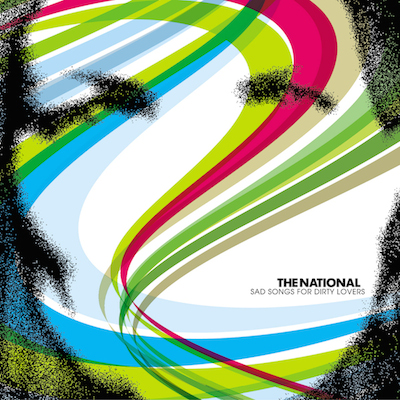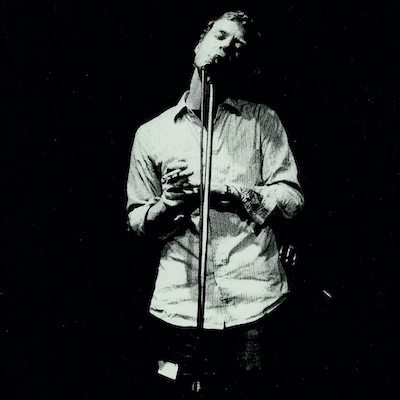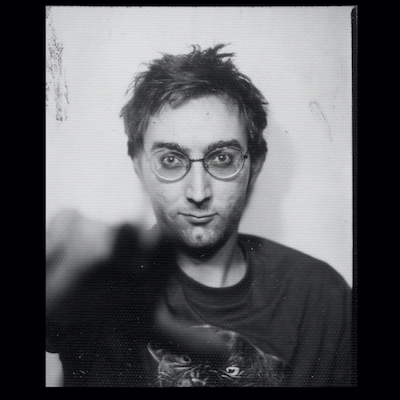
Released on September 1, 2003
HWY-003
CD, LP, Digital
Purchase Album
Featured Collaborators
Songs
- Cardinal Song
- Slipping Husband
- 90-Mile Water Wall
- It Never Happened
- Murder Me Rachael
- Thirsty
- Available
- Sugar Wife
- Trophy Wife
- Fashion Coat
- Patterns of Fairytales
- Lucky You
Notes
"A genuine treasure, Sad Songs…is one of those records that seem...to become an instant obsession... Livid as a bruise, this is brave, desperate and desperately beautiful music." - Uncut
• Start with "Cardinal Song"
•RIYL: canonical indie rock ~ Nick Cave fronting U2 with an American twang
The National were still five displaced Ohioans living in NYC not yet "the stuff underground legends are made of" (Kerrang!). Their second album is an omnibus of rock songwriting both upbeat and downcast, electric and acoustic, raging and atmospheric. Jesus is mentioned in "Cardinal Song"; "Available" and "Murder Me Rachael" may be the loudest moments in their discography; "Lucky You" among their most sincere ballads.
With this LP, the band began to receive critical praise, but a mass fanbase was still developing. For the press release drummer Bryan Devendorf wrote them an open letter, a selection of which we'll post here:
Dear _______,
The history: We came from Cincinnati (home of Pete Rose and the first Filet-O-Fish) to New York and ever-more expensive cigarettes. We started a band and recorded an album, never playing a gig. This time around we played and played and then recorded and recorded, and recorded some more, with Nick Lloyd again, at seven studios altogether: 1) Excello in Brooklyn. 2) overdubs in the penthouse of the Puck Building, whose panorama includes David Bowie's, Thurston Moore's, and Moby's lofts-cum-homes. 3 & 4) two locales in and around New Haven, one a 17th-century salt box house in the woods (note: the crickets on "Sugar Wife" are aleatoric). 5) another Brooklyn studio, Headgear, where the ghosts of GISH and HOUSES OF THE HOLY haunt the boards. (They were inherited from Butch Vig. That's right, B-u-t-c-h.) 6) in Bryan's basement (w/working fireplace). And finally, 7) mixing and recording still more with Peter Katis at Tarquin Studios* in Fairfield, Conn. Think: acres of strip malls, sexy mothers in SUVs, etc. There we exhumed dying tracks in Pro Tools; others we just let die.
Many thanks for your time and consideration.
LISTEN TO "90 MILE WATERWALL" OFF SAD SONGS FOR DIRTY LOVERSThe National are five displaced Ohioans living in New York. They play smart, bracing, and beautiful rock music. Their self-titled debut was hailed throughout the US and Europe by publications ranging from the Village Voice and No Depression to Paris's Liberation. England's Kerrang! called it "the stuff underground legends are made of."
Their follow-up is a great leap forward, an omnibus of rock songwriting that is by turns upbeat and downcast, electric and acoustic, raging and atmospheric. Produced by Nick Lloyd, Peter Katis (Interpol), and Paul Heck (No Alternative; Red, Hot, and Riot!), Sad Songs for Dirty Lovers is a bold statement, a song cycle about men and women and all the ways things go wrong and right.
Upon release, critics grasped for superlatives in praising Sad Songs for Dirty Lovers. Publications like Uncut and The Chicago Tribune named it an album of the year, while Magnet hailed it as one of the year's "hidden gems." Billboard featured them as a "Hot Artist," CMJ named them a band "On the Verge."
Notes on the making of the second record by Bryan Devendorf, drummer for The National:
Dear _______,
What Thomas Hardy did for women and Dr. Frankenstein did for the dead, we do for rock-and-roll on SAD SONGS FOR DIRTY LOVERS. It's a still life. Men and women in suspended animation: Tess Durbeyfield forever "throbbing and looking out at the meads"; Paris dithering, golden apple in hand. It's about pleasure wrapped in pain and "the blackness of unutterable night" that follows a sunny day.
The history: We came from Cincinnati (home of Pete Rose and the first Filet-O-Fish) to New York and ever-more expensive cigarettes. We started a band and recorded an album, never playing a gig. This time around we played and played and then recorded and recorded, and recorded some more, with Nick Lloyd again, at seven studios altogether: 1) Excello in Brooklyn. 2) overdubs in the penthouse of the Puck Building, whose panoroma includes David Bowie's, Thurston Moore's, and Moby's lofts-cum-homes. 3 & 4) two locales in and around New Haven, one a 17th-century salt box house in the woods (note: the crickets on "Sugar Wife" are aleatoric). 5) another Brooklyn studio, Headgear, where the ghosts of GISH and HOUSES OF THE HOLY haunt the boards. (They were inherited from Butch Vig. That's right, B-u-t-c-h.) 6) in Bryan's basement (w/workng fireplace). And finally, 7) mixing and recording still more with Peter Katis at Tarquin Studios* in Fairfield, Conn. Think: acres of strip malls, sexy mothers in SUVs, etc. There we exhumed dying tracks in Pro Tools; others we just let die.
We were very grateful to have additional personnel on hand: Clogs' Padma Newsome and his vampire opera of strings; Nick Lloyd's keyboards and calm center; Nate Martinez's slow hand; and "Steve" on mellophone and French horn. Thank you all.
The seasons turned from winter to spring, spring to summer, then summer gave way to fall. All were seen (or not seen) from the studio womb; we were learning the true value of things and proper conduct among others, sharing the same space for days at a time. It put me in mind of TWELVE ANGRY MEN or Skylab, of everyone who'd occupied the same couches and swivel chairs before us and thought, "Our shit is so hot ... I could go for some sesame chicken right about now."
Many thanks for your time and consideration.
Best,
Bryan Devendorf
*which occupies the attic of a 7000 square foot Victorian house built in 1891. Recalls Peter, "I remember I was sitting here with no walls and no floors, sitting on the joists, and looking at the wide open space, and saying, "How the heck am I gonna lay this out?" A blank sheet of paper, a blank reel, an unfinished room. All the same in the end.
PRESS
Magnet: Hidden Gem of 2003
Rolling Stone #934 (Oct 30, 2003) by Greg Kot: When Matt Berninger moans, "Let her treat you like a criminal, so you can treat her like a priest," at the outset of the National's second album, Sad Songs for Dirty Lovers, you just know these boys got it bad. Girl trouble, that is. Plunging into the desperate erotica of their Leonard Cohen-meets-Joy Division world, this Brooklyn quintet sounds both decadent and deprived when brooding about betrayal, lust, even their snappy new outerwear ("Fashion Coat"). Violins swoon, bells toll, keyboards get shrouded in fog. The band patiently nurtures the tension beneath the surface, but when it pops -- especially in the hurtling coda to "Available," the violent last verse of "Slipping Husband," the screaming-poltergeist guitars that twist their way through "Murder Me Rachael" -- the grief turns nasty.
Uncut: A genuine treasure... No one has written the uneasy poetry of self-disgust with such brutality since Mark Eitzel at his best. Livid as a bruise, this is brave, desperate and desperately beautiful music.
The London Sunday Times: Intense? Powerful? Let's just say that if Johnny Cash was still with us, this would be a contender for his next album.
Pitchfork.com: 8.4 out of 10 rating Since The National's excellent self-titled debut in 2001, the Brooklyn-via-Cincinnati quintet has continued developing its hard-knock aesthetic, and lucky for the listener, Berninger's relationships don't appear to be getting any better... Each of the dozen laments on Sad Songs for Dirty Lovers balance catchy choruses, exquisite instrumental interludes, and the complex words of a man's grieving. By the time you reach the final punch line of "Lucky You" you feel you know Berninger, want to offer him a coat, a smile, and some warmth to make it through another sleepless night. But on second thought, with that added comfort maybe he'd stop singing these beautiful songs: so you hold off, sit back down, and continue listening to this gorgeous train wreck.




